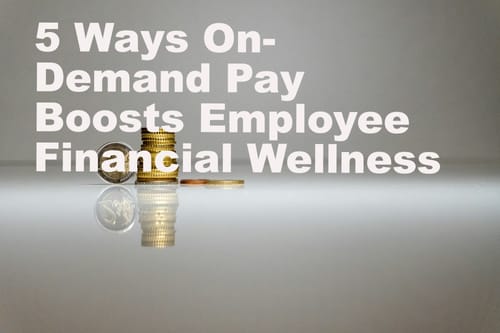In today's fast-paced world, financial stress has become an all-too-common challenge for many workers. Enter on-demand pay, a revolutionary payroll solution that's not just changing how employees get paid, but also significantly improving their financial wellness. Let's dive into five key ways on-demand pay is making a positive impact on employees' financial health.
1. Reducing Reliance on High-Interest Loans
One of the most immediate benefits of on-demand pay is its ability to help employees avoid costly payday loans and credit card debt. Consider this scenario:
John, a warehouse worker, unexpectedly needs to replace his car's transmission. Without on-demand pay, he might turn to a payday loan with an astronomical interest rate. But with access to his earned wages, John can cover the repair cost without falling into a debt trap.
According to a study by the Financial Health Network, 38% of employees who use on-demand pay reported a decrease in short-term, high-interest borrowing. This reduction in high-cost debt can lead to significant savings over time, improving overall financial health.
2. Improving Budgeting and Financial Planning
On-demand pay provides employees with real-time visibility into their earnings, which can be a game-changer for budgeting and financial planning. Imagine Sarah, a retail associate, who's trying to save for a down payment on a house. With traditional bi-weekly pay, it's challenging for her to track her progress accurately.
But with on-demand pay, Sarah can see her earnings accumulate daily, making it easier to stick to her savings goals and adjust her spending habits.This increased transparency helps employees:
- Make more informed financial decisions
- Align their spending with their actual earnings
- Set and achieve short-term and long-term financial goals
A survey by PwC found that 72% of employees who use on-demand pay reported feeling more in control of their finances, leading to better overall financial wellness.
3. Reducing Financial Stress and Anxiety
Financial stress can have a significant impact on employee well-being and productivity. On-demand pay helps alleviate this stress by providing a financial safety net. Let's look at Maria, a healthcare worker and single mother.
Before on-demand pay, she would often lie awake at night worrying about how to cover unexpected expenses. Now, knowing she can access her earned wages if needed, Maria feels more secure and less anxious about her finances.
This reduction in financial stress can lead to:
- Improved mental health
- Better sleep quality
- Increased focus and productivity at work
In fact, a study by the American Psychological Association found that money is a top source of stress for 72% of Americans. On-demand pay directly addresses this issue, contributing to overall employee wellness.
4. Encouraging Better Financial Habits
On-demand pay isn't just about accessing wages early; it's also a tool for developing better financial habits. Many on-demand pay platforms come with built-in financial wellness features that encourage responsible use and smart money management.
For example, Tom, an office administrator, uses his on-demand pay app not just to access his wages, but also to:
- Track his spending patterns
- Set savings goals
- Receive personalized financial tips
These features help employees like Tom develop a more proactive approach to their finances, leading to improved long-term financial health.
5. Providing a Buffer for Unexpected Expenses
Life is full of surprises, and not all of them are pleasant – especially when they come with a price tag. On-demand pay provides a crucial buffer for these unexpected expenses.
Consider Lisa, a teacher who discovers a leak in her roof right after a heavy rainstorm. In the past, this might have forced her to put the repair on a credit card or delay it altogether, potentially causing more damage. With on-demand pay, Lisa can access her earned wages to address the issue promptly, avoiding additional stress and potential long-term costs.
This ability to handle unexpected expenses without derailing their budget or incurring debt is a significant boost to employees' financial wellness and resilience.
The Bigger Picture: On-Demand Pay and Financial Wellness
The impact of on-demand pay on financial wellness goes beyond these five points. By giving employees more control over their earnings, it fosters a sense of financial empowerment. This, in turn, can lead to:
- Increased job satisfaction
- Improved work-life balance
- Greater overall well-being
Moreover, when employees are less stressed about their finances, they're more likely to engage with other financial wellness initiatives offered by their employer, creating a positive cycle of financial health improvement.
Why Choose OrbisPay for On-Demand Pay?
As we've explored, on-demand pay is a powerful tool for boosting employee financial wellness. If you're considering implementing this innovative solution, Orbispay is here to help.
Orbispay offers a comprehensive on-demand pay platform designed to support your employees' financial health. Our solution not only provides flexible access to earned wages but also includes features to promote better financial habits and decision-making.
With Orbispay, you can:
- Offer your employees a valuable financial wellness benefit
- Reduce financial stress in your workforce
- Improve employee satisfaction and retention
- Support better budgeting and financial planning among your staff
Don't let financial stress hold your employees back. Take a step towards a financially healthier workforce today.
Ready to boost your employees' financial wellness with on-demand pay? Contact OrbisPay now for a free demo and discover how our solution can transform your employees' financial health.
In conclusion, on-demand pay is more than just a payroll innovation – it's a powerful tool for improving employee financial wellness. By reducing reliance on high-interest loans, improving budgeting skills, reducing financial stress, encouraging better financial habits, and providing a buffer for unexpected expenses, on-demand pay is helping employees build a stronger financial foundation. As this trend continues to grow, we can expect to see more employers adopting this solution as part of their commitment to employee well-being.

